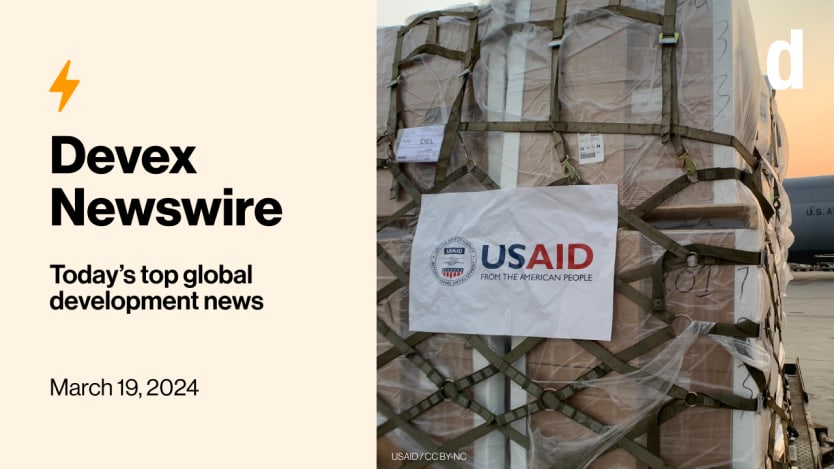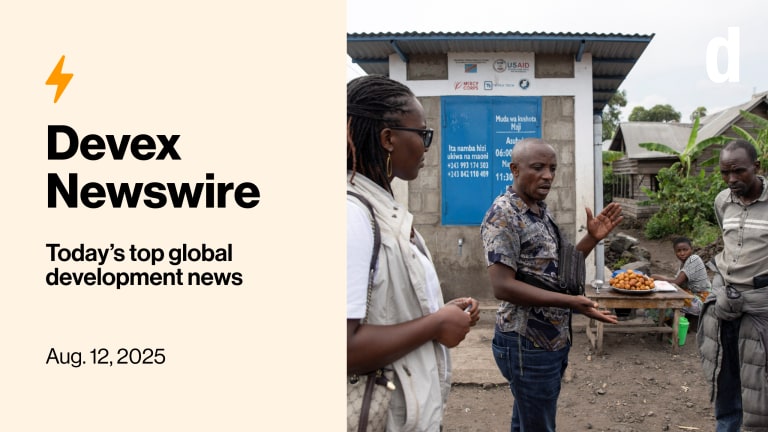Presented by the Mastercard Center For Inclusive Growth

USAID is embarking on a big, bold new journey to deliver lifesaving supplies around the globe, but is it walking a well-tread — and tired — path to do so?
Also in today’s edition: What do project managers make, what should Africa do to leverage its negotiating position in pandemic talks, and what’s the latest in Gaza’s imminent famine.
Upcoming event: On April 3, we’ll be exploring what’s at stake for foreign aid and development in the upcoming U.S. election. Save your spot.
Next level
It involves billions of dollars and could touch the lives of millions of people. It’s also running late and already courting controversy.
The stakes are high for USAID’s NextGen suite of programs, a 10-year, $17 billion revamp of the way the agency procures and distributes health supplies across the world.
This is a preview of Newswire
Sign up to this newsletter for an inside look at the biggest stories in global development, in your inbox daily.
The newest tranche — which centers on HIV/AIDS commodities such as antiretroviral medications, hospital beds, and condoms — is expected to have a $4.8 billion price tag over the next decade alone.
And when the stakes are this high, the competition is bound to be fierce, my colleague Elissa Miolene writes.
The contracts could, in theory, serve as a model of the agency’s pledge to steer more money to smaller local organizations, but experts are dubious.
“If this award goes wrong, you will be costing people’s lives,” says one supply chain expert familiar with the program, who requested anonymity due to his affiliation with a competing company. “There’s only so many people that I think USAID will have confidence in to do the work.”
“These contracts look like the way USAID has been doing business for the last 60-plus years,” says Walter Kerr of Unlock Aid, a coalition group trying to change the way USAID awards contracts. “[The NextGen suite is composed of] huge awards issued out of Washington, D.C., that are written for the usual suspects to win.”
NextGen will replace the agency’s current Global Health Supply-Chain Program, which was led by Chemonics International and which, if you remember, our investigation found was mired in mistakes, delays, and mismanagement.
Read: USAID's largest NextGen contract unveiled — who will get $5 billion? (Pro)
+ Devex Pro members can get the most out of our USAID coverage. Not yet a Devex Pro member? Start your 15-day free trial today to access all our expert analysis, insider insights, career resources, exclusive events, and more.
By the numbers
Let’s face it, being a development professional is hard — whether it’s in USAID, at a big D.C. firm, or out in the field. But it’s still in high demand, as evidenced by our buzzing jobs board, and one of the most coveted jobs on that board is project manager.
So what’s one of the biggest questions people have about being a project manager? The obvious one: What would I make? Don’t worry, we’ve got you covered.
We surveyed the salary landscape based on data we’ve obtained from organizations and working professionals since 2019 — encompassing nearly 1,044 positions from 213 organizations.
We uncovered which organizations have been the most salary-transparent, which ones shell out the most — hint, Amazon is on the list — which have hired the most, and what development professionals can expect to earn based on region and experience level.
Read: What we know about project manager salaries in global development (Career)
+ A Devex Career Account includes all the valuable tools you need to be successful in your globaldev job hunt. Start your 15-day free trial today.
CDC-ing eye to eye
“The inequities laid bare during the COVID-19 pandemic touched a raw nerve, evidenced by the outcry from the global health community about our flawed global health security frameworks.”
— Dr. Jean Kaseya, director-general, Africa Centres for Disease Control and PreventionTo avoid the mistakes of the past, the current pandemic treaty being hammered out at the World Health Organization must “put equity at the heart of the prevention, preparation, and response work for the next outbreak,” Kaseya writes in an opinion article for Devex.
“What does this mean vis-à-vis what WHO member states should do in these next weeks as they grapple with textual negotiations and key areas of disagreement, such as pathogen access and benefit sharing, research and development conditionalities, and technology transfer? While we urge consensus by May, we also urge that we end up with a win for Africa,” he writes.
To that end, the Africa CDC director-general outlines what would constitute a win for Africa, which includes speaking with one voice to maximize the continent’s bargaining power.
Opinion: Africa needs a win from the pandemic agreement negotiations
Contraceptive choice
When people say the 90s are back, they’re usually talking about jelly shoes, but it turns out it can also apply to contraceptive science. Biodegradable contraceptive implants — matchstick-sized devices inserted in the upper arm that don’t need to be removed but instead dissolve on their own — were a big subject of research in the 90s, but now they’re having their first human trial in 20 years with a phase 1 test in the Dominican Republic.
The product, known as Casea S, was developed by nonprofit FHI 360 with funding from USAID and the Bill & Melinda Gates Foundation. But think tank Policy Cures Research tells my colleague Jenny Lei Ravelo that funding for developing new contraceptive products declined significantly from 2020 to 2021, and Dr. Kavita Nanda, FHI 360’s director of medical research, tells her many pharmaceutical companies have decreased investment into research on contraception.
Read: Biodegradable contraceptive implant moves to clinical trials
It’s only getting worse
Famine is “imminent” for at least half of Gaza’s 2.2 million population, especially in the highly likely scenario of continued escalation of the conflict with Israel, according to a report Monday by the world’s authority on food security.
The situation is especially dire for the northern Gaza Strip, where around 70% of people — about 210,000 — are already classified as experiencing catastrophic levels of hunger as Israel imposes a near-total blockade.
The Integrated Food Security Phase Classification, which was set up in 2004, has only twice before declared a famine: Somalia in 2011 and South Sudan in 2017. Its latest report on Gaza represents a troubling deterioration since its last report in December. IPC cited Israeli attacks on humanitarian aid convoys, detention of humanitarian staffers, road closures, and checkpoints as barriers for aid groups to deliver lifesaving food, nutrition, water, sanitation, and other aid to besieged Palestinians. IPC also called for an immediate ceasefire.
“This is the highest number of people facing catastrophic hunger ever recorded by the Integrated Food Security Classification system — anywhere, anytime,” U.N. Secretary-General António Guterres said Monday in New York.
“This is an entirely man-made disaster, and the report makes clear that it can be halted,” he added, calling for an immediate ceasefire and for Israeli authorities to allow full access for humanitarian convoys into the territory.
“Palestinians have been living through six months of severe hunger — a never-ending nightmare claiming children’s lives while severely malnourished women give birth to stillborn babies,” Riham Jafari, communications and advocacy coordinator at ActionAid Palestine, said in a statement. “And still, the world watches on in silence. Today’s announcement is a collective stain on humanity’s conscience and a catastrophic indictment of Western nations who have slept walked into this disaster while offering little meaningful action to avert an imminent famine.”
Background reading: Food as a weapon in the new age of starvation
ICYMI: Why famine is ‘inevitable’ in Gaza — and what’s next
In other news
Only 10 countries had healthy air quality in 2023, according to a new report by IQAir, which found that Bangladesh, Pakistan, and India had the world’s worst air pollution. [Bloomberg]
The U.K.’s contentious bill to deport asylum seekers to Rwanda moved closer to becoming law on Monday after proposed changes from the House of Lords were overturned. [Reuters]
South Sudan closed schools in preparation for an extreme heat wave expected to last two weeks. [The Guardian]
Sign up to Newswire for an inside look at the biggest stories in global development.








